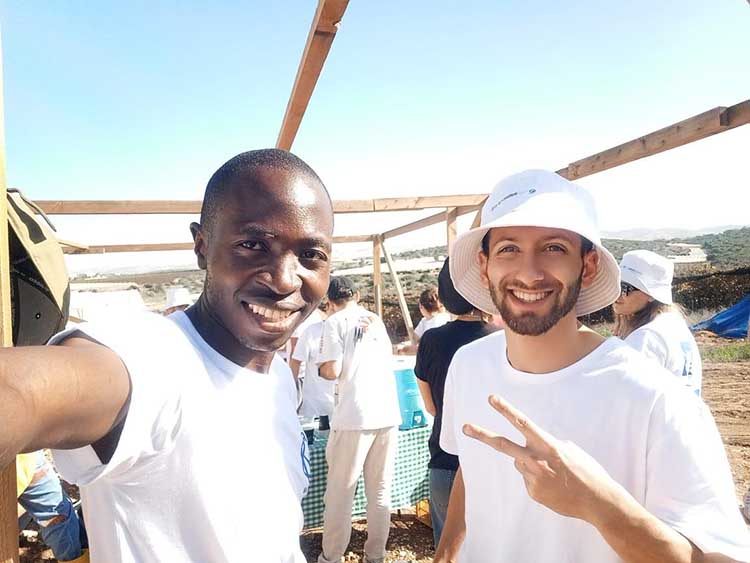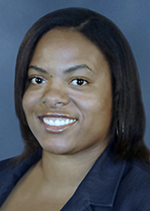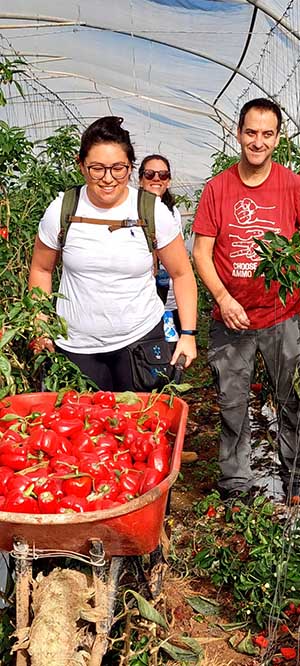
By Shoshana McKinney


NASENYI, Uganda — Ever since October 7th, Israel has been at war. The unprecedented, surprise terrorist attack that day resulted in devastating losses to the Jewish people. Per capita, the October 7th attack was the deadliest terrorist attack against any modern nation state ever in history.
The attack was a siren sound for many in Israel and around the world, bringing some remarkably surprising realizations. The enemies of Israel certainly didn’t expect the iron resolve the October 7th attack would unleash within the hearts of Jews all around the world.
Some came through organized volunteer programs and some just offered themselves upon arriving. Thousands of heroic Jewish volunteers have purposely flown in to a country at war. Shalom Corps, for example, is set to welcome 3,000 volunteers to Israel this year.
American volunteer Troy Goldenberg, 27, from Kansas City was inspired to go after he felt completely alone in his mourning around gentile friends who simply weren’t impacted by the war in Israel. “I wanted to make a physical difference, supporting Israel online was not enough.”
Ugandan-Jewish volunteer Ezera Mojja, 30, from Nasenyi Village said of his youth, “At school there was a map of Israel on the wall and we were taught to love Israel at Jewish day school.”
For volunteers like Mojja from countries with weaker passports, volunteering in Israel involves finding a specific volunteer program hosted by an Israeli organization followed by an obstacle course of paperwork for the visitor visa.
A rabbi who teaches the Zoom Hebrew language class Mojja attends first mentioned the volunteer opportunity, sponsored by Marom Olami, an Israel-based organization.
After a formal, written invitation was made with the application, the Israeli government even required Mojja to submit to an interview for the visitor visa.
“I knew that I’m going to a country in grief and mourning. I felt so emotional going through the airport with hostage posters all over the walls.” Mojja sighed as he remembered being overwhelmed by the dehumanizing captivity still suffered by 129 people.
Upon arrival in Israel, Goldenberg shook that feeling of isolation that comes with the experience of being a minority. “When I’m in Israel, I’m where I need to be,” he said.
Mojja joined a group of 22 Jewish volunteers from a diverse group of countries including Brazil, France, Uruguay, Spain, U.S, Germany and Argentina. The volunteer experience really brought them together as friends. “Most volunteers knew English but we taught some to whoever didn’t know.” Mojja recalled with a laugh, “Even the Russian and the Ukrainian got along well!”
The Marom organizers knew that they needed to create an urgent volunteer program when most of the agricultural workers left Israel within a week of the start of the war. “We had to do something, we could not just sit and wait,” their leader Roo’ee stated. Of the Marom leadership discussion to create the volunteer program, “It felt like group therapy,” he said, acknowledging the empowering and healing benefits of taking action in times of distress.
Far from their normal day jobs, the Marom volunteers picked green and red bell peppers and cleaned out heavy loads of tomatoes left to rot on their greenhouse vines. Shoulder to shoulder with the wives of the farmers, (who were on IDF reserve duty) they rode to the farms from their accommodations in Beersheva.
Since the agricultural workers fleeing the fighting left the country entirely, Israeli farmers are still assessing the extent of losses from the uncollected harvest. Israel has offered agricultural workers in Malawi and Kenya opportunities in their stead.
At the various work sites near Beersheva, taking time each night during the Jewish festival of Hanukkah for candle lighting and songs had special meaning to the volunteers. The events commemorated during the holiday of Hanukkah happened in the 2nd century at the tail-end of an existential war of Jewish independence right alongside internal challenges to Jewish identity and the weakening of Hebrew culture.
While touring around the Israeli countryside, Mojja’s connection to the land only grew, “I felt like it’s our home. People were united to make the country stand tall.”
Routine pilgrimages to the Western Wall in Jerusalem had special meaning for the volunteers, for several of whom this was their first time in Israel. Whenever their duties took them close to the Gaza border, they could hear the non-stop sounds of guns and bombs in the distance.
Reminders of heavy fighting and the initial attack were everywhere. The abandoned belongings and burned out cars from the Nova Music Festival were carefully turned into a memorial art installation.
The last few days in normally bustling Tel Aviv gave the volunteers a glimpse at what city life could be like. For Goldenberg, who hopes to make aliyah one day, the trip made him more eager to return long-term.
Near the end of their journey, these volunteers comforted hostage families and met with Israeli politicians who graciously thanked them for coming.
In these days of internet armchair activism, it’s remarkable when people come together and put time and sweat into their values. For these lovers of Israel, heeding the powerful call of the homeland not only deepened their connection to their heritage but opened their eyes to the human costs behind the headlines.
*
Shoshana McKinney is a Jewish African-American living with her husband and child in the village of Nasenyi near Mbale, Uganda. She is the executive director of Tikvah Chadasha (New Hope) Uganda.